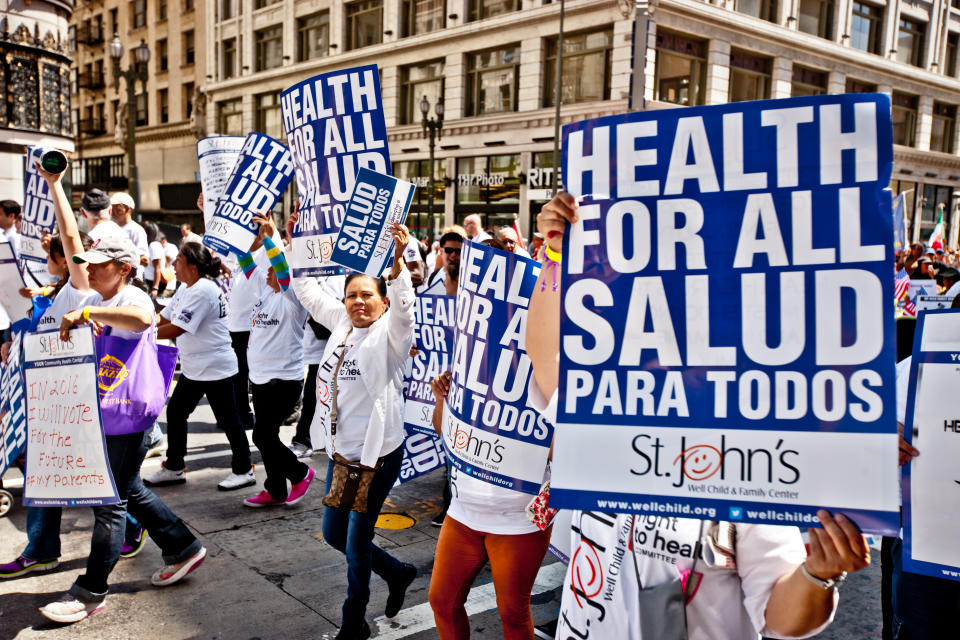Three state attorneys general challenge Trump on immigrant benefits
Three state attorneys general and New York City have filed suit against a rule change by the Trump administration, which make it harder for legal immigrants to obtain government funded benefits like food stamps and Medicaid.
The proposed change considers a legal immigrant using more than one public benefit, for more than 12 months in a 36 month period, a potential burden to the country — thereby considering them a potential “public charge.”
The rule defines public benefit as cash from programs that include income maintenance, Supplementary Security Income, Temporary Assistance to Needy Families (TANF), Supplemental Nutrition Assistance Program (SNAP), Medicaid and housing programs.
The Department of Homeland Security announced the new final rule last week, which will go into effect October 15. But 20 separate states have mounted legal challenges, with dozens of other suits filed by health care and immigrant advocacy groups.
The suit, filed on Tuesday in the Southern District of New York, was joined by Vermont and Connecticut. New York Attorney General Letitia James accused the administration of discriminating against immigrants with the rule change, saying it threatened the health and safety of residents.
“Quite simply, under this rule, more children will go hungry, more families will go without medical care and more people will be living in the shadows and on the streets,” James said. “We cannot and we will not let that happen.”

Delivering on a ‘promise’
The public charge rule is one that U.S. Citizen and Immigration Services acting director, Ken Cuccinelli said simply enforces the laws already on the books.
“For over a century, the public charge ground of inadmissibility has been part of our nation’s immigration laws,” he said in a recent statement.
“President Trump has delivered on his promise to the American people to enforce long-standing immigration law by defining the public charge inadmissibility ground that has been on the books for years,” he added.
Health care providers say the move may affect individuals that have found coverage through Medicaid in expansion states.
Charity care, a reimbursement model for uncompensated care, typically covers uninsured patients who are either treated for free, or offers reduced rates after qualifying as low-income.
But greater coverage via subsidized policies on the Affordable Care Act exchange and Medicaid enrollment has seen those costs cut in half. The American Hospital Association has previously reported that charity care spending hit a 25-year low in 2015.
The public charge rule announcement acknowledged it would see uncompensated care rise, which in turn pushes up overall health care costs.
“Hospitals are going to be forced back into those dark days that were pre-expansion,” said Cathleen Bennet, the New Jersey Hospital Association’s president and CEO, and a former state department of health commissioner, told Yahoo Finance.
“When [immigrants] do seek care, they are going to be sicker and need charity care,” she added.
Chain reaction
If hospitals are incurring greater costs, they are going to want to seek greater reimbursements as well. That will play a role in the prices they negotiate with insurance companies, which is a factor in determining premiums.
The public charge could also deter segments of the population from seeking care, or at least avoiding it due to costs.
That would likely result in a spike in costs to hospitals. In a letter to DHS when the rule was first proposed, the American Hospital Association estimated the total loss to hospitals at $17 billion, based on 2016 spending.
“This loss of coverage ultimately transfers the financial burden to hospitals for the needed care provided to this population,” the AHA said — as states with large immigrant populations, like Florida and Texas, bearing the brunt of the cost surge.
—
Anjalee Khemlani is a reporter at Yahoo Finance. Follow her on Twitter: @AnjKhem
Read the latest financial and business news from Yahoo Finance
Follow Yahoo Finance on Twitter,Facebook,Instagram,Flipboard,SmartNews,LinkedIn, YouTube, and reddit.

 Yahoo Finance
Yahoo Finance 
